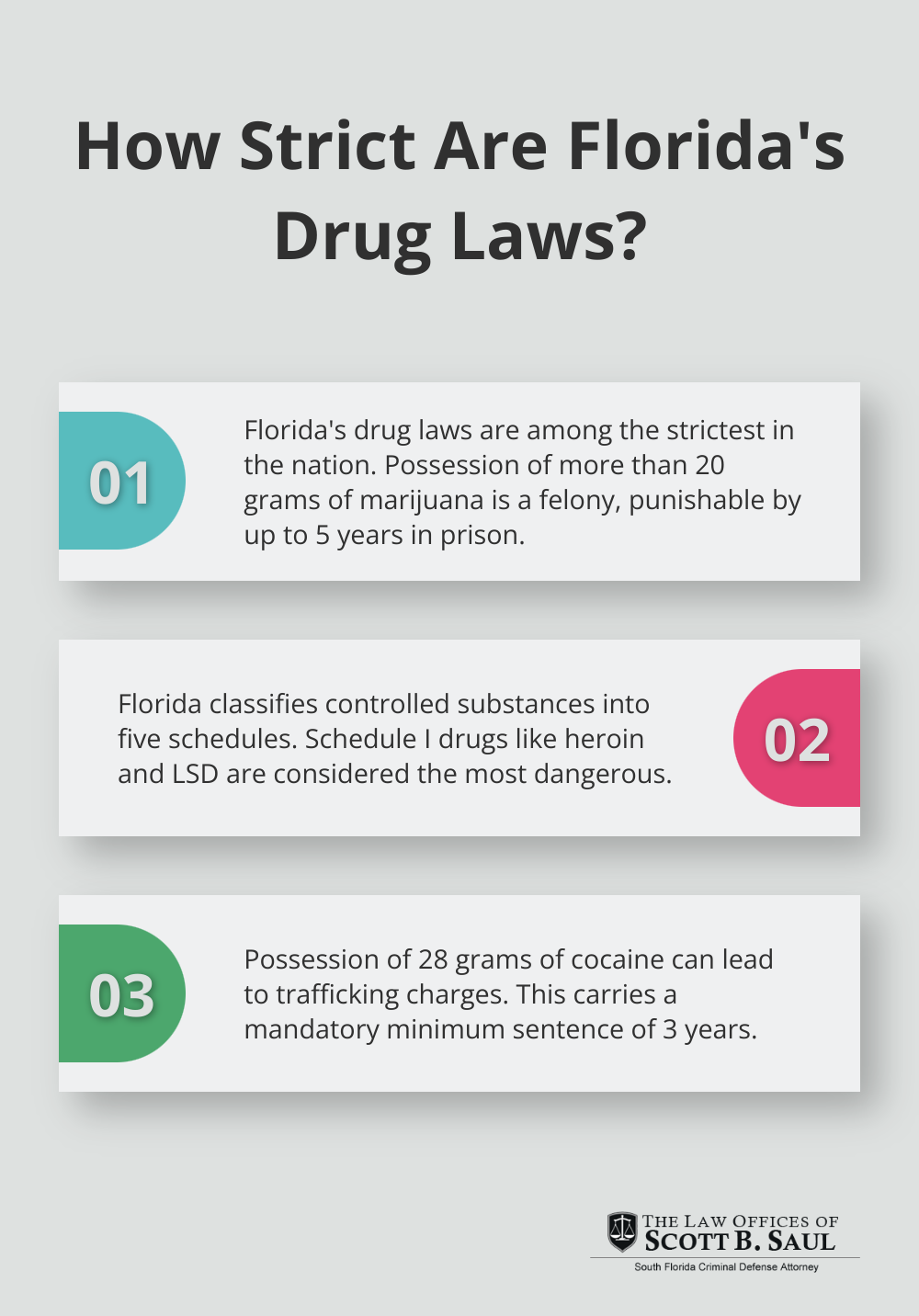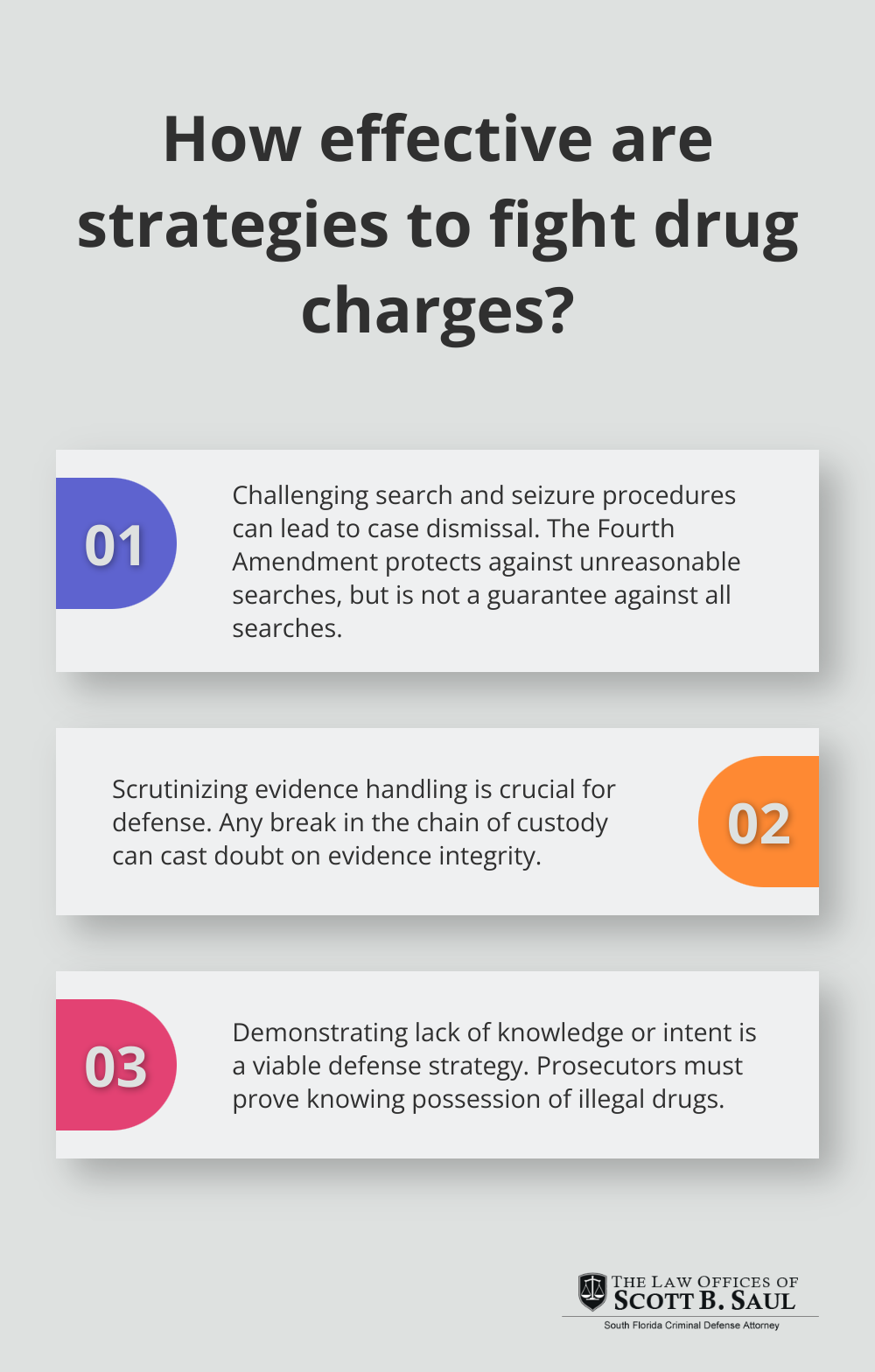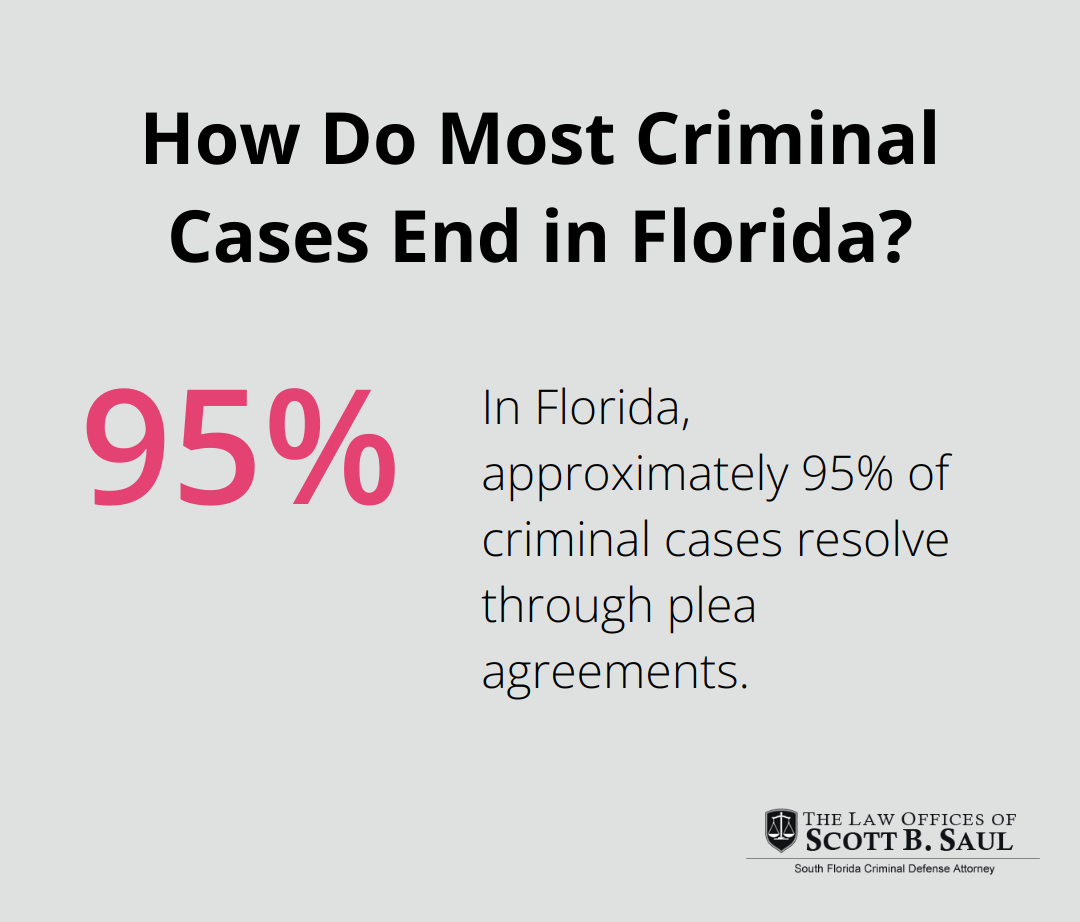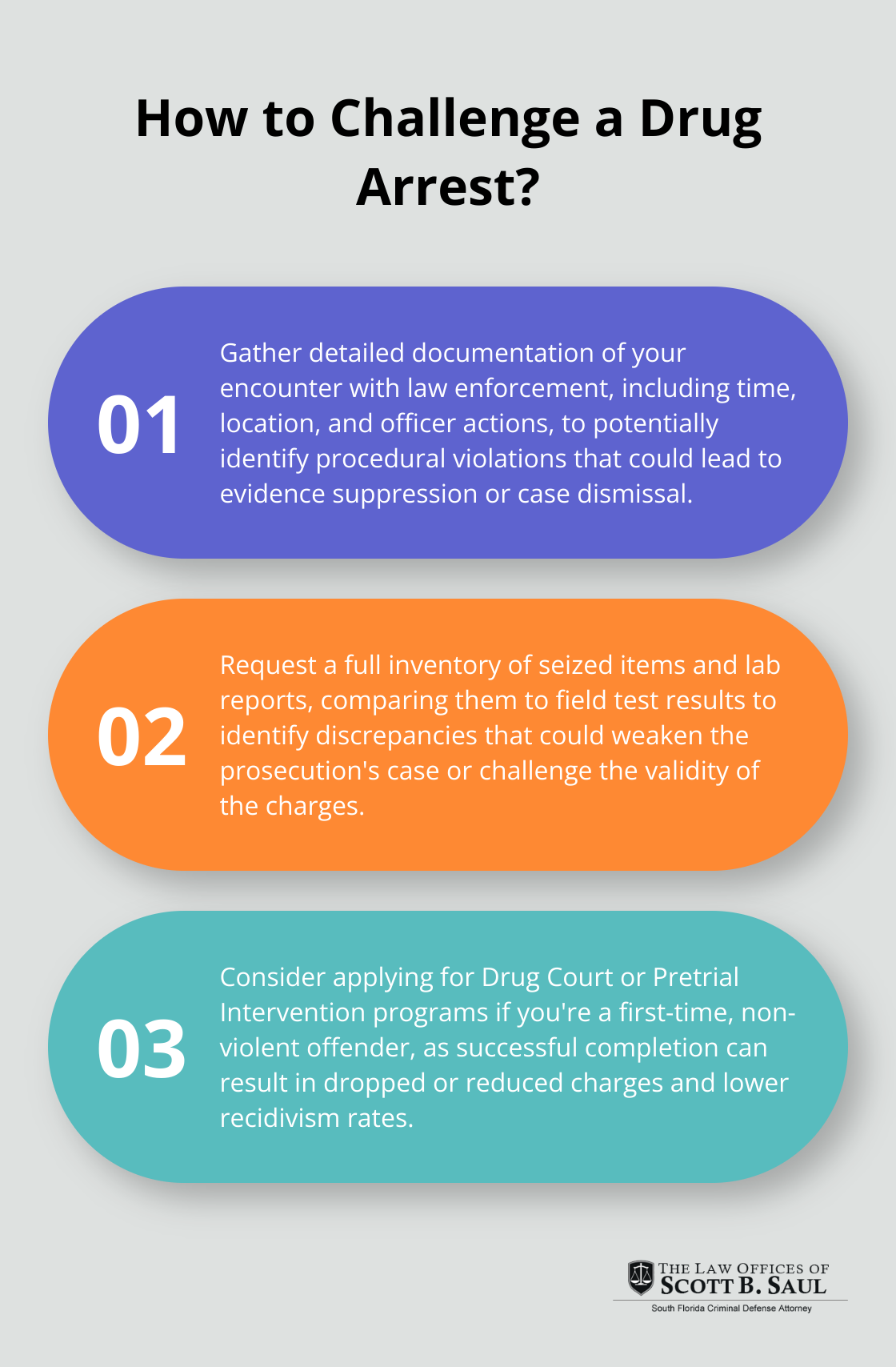How to Get Drug Charges Dropped: Legal Strategies
By : saulcrim | Category : Criminal Defense | Comments Off on How to Get Drug Charges Dropped: Legal Strategies
21st Feb 2025

Facing drug charges in Florida can be overwhelming, but there are ways to fight back. At Law Offices of Scott B. Saul, we’ve helped many clients navigate this complex legal landscape.
This guide explores effective strategies on how to get drug charges dropped or reduced. We’ll cover legal defenses, alternative options, and the importance of experienced representation in these cases.
Understanding Florida’s Drug Charges
Florida’s drug laws rank among the nation’s strictest, with certain state laws escalating possession to trafficking or similarly serious charges based only on the amount possessed. The landscape of drug offenses in this state presents a complex challenge for those facing allegations.
Types of Drug Charges in Florida
Florida law classifies controlled substances into five schedules, with Schedule I drugs (such as heroin and LSD) considered the most dangerous. Common charges include possession, sale, manufacturing, and trafficking. Even small quantities of certain drugs can result in felony charges. For example, possession of more than 20 grams of marijuana constitutes a felony in Florida, potentially leading to a 5-year prison sentence.
Factors Influencing Charge Severity
Several elements affect the severity of drug charges in Florida:
- Drug Type and Quantity: The specific substance and amount play a significant role. Possession of 28 grams of cocaine, for instance, can lead to trafficking charges, carrying a mandatory minimum sentence of 3 years.
- Location: The place where the offense occurred matters. Selling drugs near schools or parks often results in enhanced penalties.
- Prior Convictions: Florida’s habitual offender laws can double or even triple standard sentences for repeat offenders.
- Presence of Firearms: Possession of firearms during a drug offense can trigger mandatory minimum sentences designed to provide clear, non-negotiable penalties for firearm-related felonies.
Consequences of Drug Convictions
A drug conviction in Florida carries severe repercussions beyond jail time:
- Financial Impact: Fines can reach tens of thousands of dollars for serious offenses.
- License Suspension: A conviction may result in driver’s license suspension, even if the offense didn’t involve driving.
- Long-term Effects: Drug convictions can hinder employment opportunities, housing applications, and professional licensing. For non-citizens, it may lead to deportation. Students might lose eligibility for federal financial aid.

The severity of these consequences underscores the importance of a robust defense strategy. Experienced legal representation can make a significant difference in navigating Florida’s complex drug laws and exploring options to reduce or dismiss charges.
As we move forward, we’ll examine effective legal strategies to fight drug charges, providing insights into how defendants can protect their rights and future.
Proven Strategies to Fight Drug Charges
At Law Offices of Scott B. Saul, we have developed effective strategies to challenge drug charges in Florida. Our approach focuses on scrutiny of every aspect of the case, from the initial arrest to evidence handling. Here’s how we work to get drug charges reduced or dismissed:
Challenging Search and Seizure Procedures
The Fourth Amendment protects against unreasonable searches and seizures, but it is not a guarantee against all searches and seizures. We meticulously review police reports and body camera footage to identify potential violations. In a recent case, we argued successfully that a warrantless search of our client’s vehicle was unconstitutional, which led to the suppression of key evidence and ultimately case dismissal.

To strengthen your defense, document everything about your encounter with law enforcement. Note the time, location, and specific actions of the officers involved. This information can prove vital in identifying procedural missteps.
Scrutinizing Evidence Handling
The chain of custody is the most critical process of evidence documentation. Any break in this chain can cast doubt on the integrity of the evidence. We have seen cases where improper storage or mishandling of drug samples led to contamination or degradation, which weakened the prosecution’s case.
We recommend you ask for a full inventory of seized items and request lab reports. Discrepancies between field tests and lab results can provide grounds for challenging the charges. In one instance, we discovered that a field test incorrectly identified a legal substance as cocaine, which led to wrongful charges against our client.
Demonstrating Lack of Knowledge or Intent
Prosecutors must prove that you knowingly possessed illegal drugs. We have argued successfully in cases where clients were unaware of drugs in their possession (such as when borrowing a car or receiving a package).
If you face charges, consider who had access to the area where drugs were found. Gather witness statements or evidence showing you lacked knowledge of the drugs’ presence. This strategy has helped secure acquittals in several cases.
Exposing Entrapment
While less common, entrapment defenses can prove powerful when applicable. This occurs when law enforcement induces someone to commit a crime they wouldn’t have otherwise committed. We have handled cases where undercover officers pressured individuals into drug transactions, which crossed the line into entrapment.
Document all interactions with law enforcement, especially if you feel pressured or coerced. This information can become vital in building an entrapment defense.
These strategies form the foundation of our approach to drug charge defense. However, each case presents unique challenges and opportunities. The next section will explore alternative options for drug offenders, which can provide additional paths to resolution in certain situations.
Alternative Paths for Drug Offenders
Drug Court Programs
Florida’s legal system provides several alternatives to traditional prosecution for drug offenders. Drug courts offer a supervised treatment program as an alternative to incarceration. Participants undergo regular drug testing, counseling, and court appearances. Drug court participants have lower rates of recidivism (drug and non-drug offending) than similar offenders who did not participate in such programs.

To qualify for drug court, offenders must usually be non-violent, first-time offenders charged with possession or minor drug-related crimes. The program typically lasts 12-18 months. Successful completion can result in dropped or reduced charges.
Pretrial Intervention Programs
Pretrial Intervention (PTI) programs offer another path for first-time offenders. These programs, available in many Florida counties, allow defendants to complete community service, counseling, and other requirements in exchange for dismissed charges.
The Florida Department of Corrections oversees PTI programs statewide. This high success rate demonstrates the effectiveness of these programs in diverting offenders from the traditional court system.
Plea Bargaining Strategies
Plea bargaining remains a common resolution for drug cases. In Florida, approximately 95% of criminal cases resolve through plea agreements. A skilled defense attorney can negotiate for reduced charges or lighter sentences.
One effective strategy involves pleading to a lesser offense, such as possession of drug paraphernalia instead of drug possession. This can result in lower fines and avoid mandatory minimum sentences associated with drug possession convictions.
The decision to accept a plea bargain requires careful consideration of all potential consequences. An experienced attorney (such as those at Law Offices of Scott B. Saul) can provide guidance on whether a plea offer serves your best interest.
Rehabilitation and Treatment Programs
Many Florida courts recognize the value of rehabilitation over punishment for drug offenders. Judges may order participation in drug treatment programs as part of a sentence or as a condition of probation. These programs often include:
- Inpatient or outpatient substance abuse treatment
- Individual and group counseling
- Regular drug testing
- Life skills training
Successful completion of these programs can lead to reduced sentences or even dismissed charges in some cases. They also provide valuable tools for long-term recovery and reduced risk of future offenses.
Final Thoughts
Drug charges in Florida require a strategic approach and expert guidance. The path to get drug charges dropped often depends on the skill and experience of your legal representation. At Law Offices of Scott B. Saul, we understand Florida’s drug laws and have achieved successful outcomes for our clients.

Every drug case presents unique challenges and opportunities. The strategies we discussed can serve as powerful tools in your defense, but their effectiveness varies based on individual circumstances. Early intervention by a knowledgeable attorney can significantly impact the outcome of your case.
If you face drug charges in South Florida, don’t navigate this challenging time alone. Law Offices of Scott B. Saul brings over three decades of experience in criminal defense to your case. Contact us for a comprehensive consultation and let us work to protect your rights and future.
Archives
- July 2025 (2)
- June 2025 (9)
- May 2025 (9)
- April 2025 (8)
- March 2025 (9)
- February 2025 (8)
- January 2025 (9)
- December 2024 (10)
- November 2024 (5)
- July 2024 (2)
- June 2024 (2)
- May 2024 (2)
- April 2024 (2)
- March 2024 (2)
- February 2024 (2)
- January 2024 (2)
- December 2023 (2)
- November 2023 (2)
- October 2023 (2)
- September 2023 (2)
- August 2023 (1)
- July 2023 (2)
- June 2023 (2)
- May 2023 (2)
- April 2023 (2)
- March 2023 (2)
- February 2023 (2)
- January 2023 (2)
- December 2022 (2)
- November 2022 (2)
- October 2022 (2)
- September 2022 (2)
- August 2022 (2)
- July 2022 (2)
- June 2022 (2)
- May 2022 (2)
- April 2022 (2)
- March 2022 (2)
- February 2022 (2)
- January 2022 (2)
- December 2021 (2)
- November 2021 (2)
- October 2021 (2)
- September 2021 (2)
- August 2021 (2)
- July 2021 (2)
- June 2021 (2)
- May 2021 (2)
- April 2021 (2)
- September 2020 (5)
- July 2020 (4)
- June 2020 (4)
- May 2020 (4)
- April 2020 (5)
- March 2020 (4)
- February 2020 (4)
- January 2020 (4)
- December 2019 (1)
- November 2019 (4)
- October 2019 (4)
- September 2019 (4)
- August 2019 (4)
- July 2019 (5)
- June 2019 (4)
- May 2019 (4)
- April 2019 (4)
- March 2019 (4)
- February 2019 (4)
- January 2019 (4)
- December 2018 (4)
- November 2018 (5)
- October 2018 (5)
- September 2018 (4)
- August 2018 (4)
- July 2018 (7)
- June 2018 (4)
- May 2018 (4)
- April 2018 (8)
- March 2018 (4)
- February 2018 (4)
- January 2018 (4)
- November 2017 (4)
- October 2017 (4)
- September 2017 (4)
- August 2017 (7)
- July 2017 (6)
- June 2017 (4)
- May 2017 (4)
- April 2017 (4)
- March 2017 (4)
- February 2017 (7)
- January 2017 (4)
- December 2016 (7)
- November 2016 (4)
- October 2016 (4)
- September 2016 (10)
- August 2016 (4)
- July 2016 (4)
- June 2016 (4)
- May 2016 (4)
- April 2016 (4)
- March 2016 (4)
- February 2016 (7)
- January 2016 (4)
- December 2015 (5)
- November 2015 (4)
- October 2015 (7)
- September 2015 (4)
- August 2015 (4)
- July 2015 (13)
- June 2015 (9)
- May 2015 (8)
- April 2015 (6)
- March 2015 (4)
- February 2015 (4)
- January 2015 (4)
- December 2014 (4)
- November 2014 (4)
- October 2014 (4)
- September 2014 (3)
Categories
- Adjudication (1)
- Bankruptcy (1)
- Burglary Crimes (3)
- calendar call (1)
- Car Accident (1)
- Criminal Defense (333)
- Cyber Crimes (7)
- DNA (1)
- Domestic Violence (9)
- Drug Crimes (5)
- DUI (12)
- Embezzlement (1)
- Environmental Crimes (4)
- Expungement Law (2)
- Federal Sentencing Law (3)
- Firearm (3)
- Forgery (4)
- General (82)
- Healthcare (3)
- Immigration (1)
- Indentity Theft (1)
- Insurance (5)
- judicial sounding (2)
- Juvenile Crimes (4)
- Manslaughter (4)
- Money Laundering (3)
- Organized Crime (1)
- Racketeering (1)
- Reckless Driving (3)
- RICO (3)
- Sealing and Expunging (2)
- Sex Offense (1)
- Shoplifting (1)
- Suspended Driver's License (1)
- Traffic (4)
- Trending Topics (1)
- White-collar Offenses (1)

